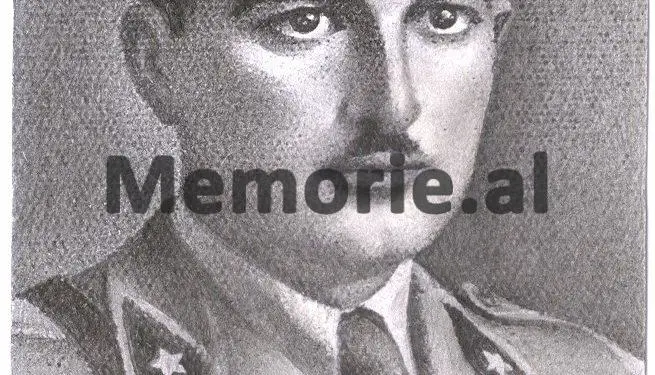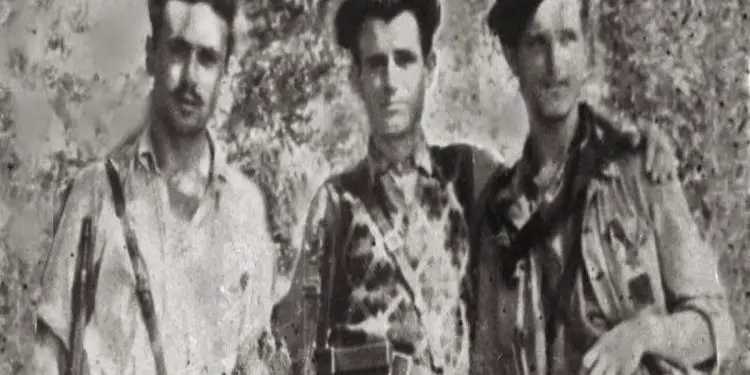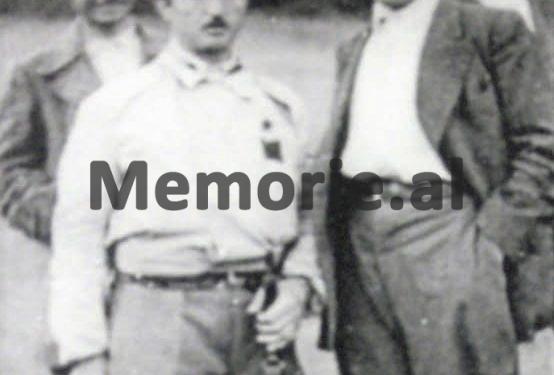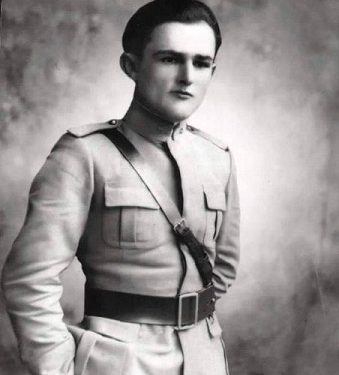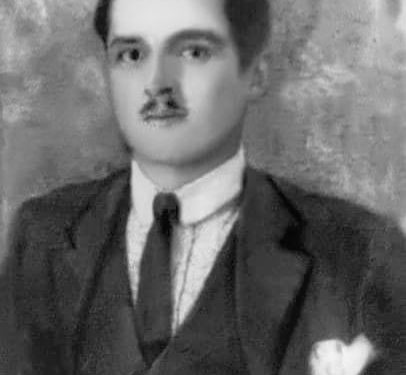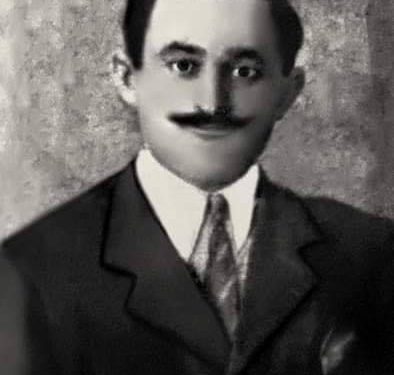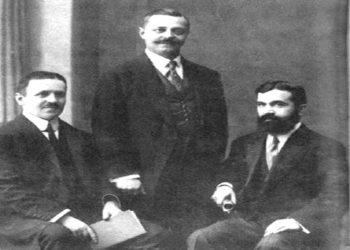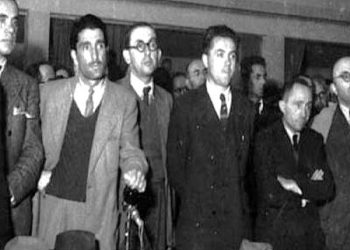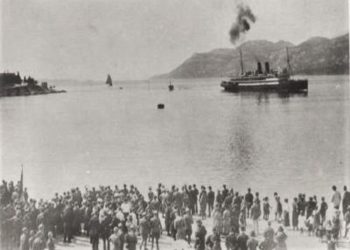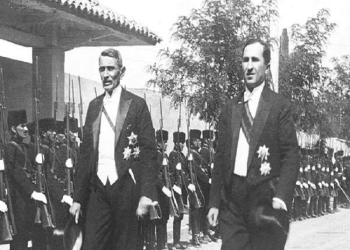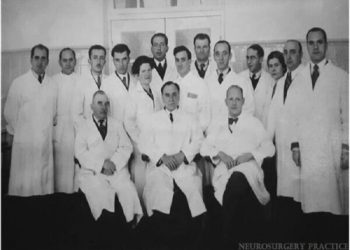By Eugen SHEHU
Memorie.al / Shijaku, that small place about 25 kilometers west of Tirana, has remained in the memory of our nation, for the endless wars against centuries-old enemies, as a constant shelter of patriotic feelings, the houses of this small town, especially in the course of the Second World War, they would turn into an outpost of the emblematic Albanian resistance. The best sons of the city would wait with rifles for the Italian occupier, but at the same time they would not be fooled by Slavic-orthodox deceptions. On the contrary, grabbing the rifle in their arms, they faced both the invaders who came to the Albanian hearths, as well as the hateful communist seed, imported from the Urals, where the Albanian communists prayed not to God, but to Belgrade. But, among the outstanding braves of Shijak’s Albanian nationalism, the memory of the great man, Mustafa Deliallis, has remained alive and immortal.
He was born in August 1911, in the city of Shijak. His father, Dalip Deliallisi, took part in escorting Ismail Qemal from Vlora to the historic Assembly of November 1912, with other brave men from Durrës. He, in collaboration with Sali Gjuka, initiated the opening of the first Albanian school in Shijak, in the spring of 1913.
While in the riots of 1914, when Esat Pashë Toptani and his supporters sought to take power with the peasant uprising of Haxhi Qamili, Dalip bey Deliallisi, would rank alongside such Albanian patriots as Ismail Qemali, Mustafa Kruja, Mid’hat Frashëri, Eqrem Vlora, Mufid bey Libohova, etc., who wanted to see Albania independent from Belgrade, and further, ranked in the western civilized world.
The esadist forces tried several times in a row to make Dalip Beu their own, but he never accepted. This was the reason that with the departure of Prince Vidi from Albania, when the rebels of Haxhi Qamili ruled for two or three months, Dalip bey Deliallis was arrested with all his sons and ordered to shoot them. There were certainly some honest Albanians who, recognizing Dalip as the bearer of Albanianism, avoided bloodshed by fleeing to the forests of Librazhdi, together with the children.
Mustafa, would start his studies at the city school of Shijak, the school that Dali bey Deliallisi had built with his own financial and mental contribution. The last of the sons, he would feel surrounded by the love of his older brothers, Gani, Ymer, Masari, Kapllani and Jakupi, especially after the death of his father, in 1918. Although at school all the teachers loved him as Dalip Bey’s little son, Mustafa, never wasted this love, to become a Kapadai boy.
On the contrary, in many cases, he took his classmates home and mother Tushja, not only served them abundant lunches, but also gave them a bag of food to take to their homes. He would love those fellow sufferers, just like his older brothers, and he would also honor them. In the summer of 1924, after graduating with good results from the city school in his hometown, Mustafai, torn apart by his brothers, takes the road to Shkodër.
There, he would begin his studies at the city’s famous gymnasium, which had become the heart of Albanianism. In particular, in the company of the Kazazi brothers, Mustafa would learn about the glorious battles of the Shkodrans, both for the defense of their city, at the beginning of the century, as well as for the battles in aid of the Albanian brothers, in the wooded lands of Plava and Gucia.
Although the high school of Shkodra, at that time, carried out many cultural and artistic activities, the son of Shijak, he would have liked very much the visits to the city’s castle, or those in Tuz e Ulqin, where he met his blood brothers. After finishing high school in Shkodër (especially at the suggestion of his brother, Gani, who had finished the high military school in Istanbul), Mustafai decided to enter military studies. He goes to Tirana and in the years 1928-’29. attends the Officers’ Training School there.
In this school, among others, he also met the outstanding brave of Kosovo, Ali Riza Kosova, who, before teaching his students popular military art and the theories of modern warfare, reminded them that the borders of Albania, they were not those of 1913, but even earlier, and hopes were kept burning that one day, through the pen and rifle of the Albanians, these borders would be regained.
A tall body, with a determined look, the son of Shijak, who from his early childhood decided to become a commander and go to the mountains, where he would stand out among others, especially for the acquisition of military knowledge and the manifestation of it in practice. At the end of this school, Mustafa Deliallisi receives the rank of lieutenant and waits for appointment to duty. However, with all the topics it contained, the Officer Training School in Tirana could not equip its trainees with the appropriate knowledge.
For this reason, pushed also by his brothers, Mustafai takes the road to Italy, starting his studies at the High Military Academy in Turin.” In Italy, Mustafai had been waiting impatiently to finish school so he could return to his homeland and to give his help, like all other Albanian students who had finished European schools. As anti-fascist and nationalist at the same time, at the moment of the traditional oath, the young officer refused to kiss the Italian flag. Exactly, the fascists would never forgive him, just like Mustafa, the hatred for them never stopped”. -27)
In the early 1930s, by order of the Albanian Ministry of War, Mustafa Deliallisi was appointed commander of the military branch in Burrel. Although the King of the Albanians, the First Bird, had promoted many of Mat’s men, even Mustafa’s word had a place in the hearths of the Matjans. The men of Mat, saw in Mustafa Deliallisi, not only the demanding officer of military discipline, but also the brave man who marched to the borders of Albania, to face all the Serbian provocations.
It was precisely his bravery that in 1940, with the creation of the Civil Commissariat for Free Lands, he was appointed as the commander of the Albanian Army troops, in the ethnic territories in Montenegro. During his stay as post-commander in Ulcinj, Mustafa Deliallisi, would protect all the Albanians of those villages who, since 1880, felt the heavy weight of Montenegrin captivity on their shoulders.
He raised the Albanian flag in Ulqin and Tuz and made sure that the ethnic Albanians learned their mother tongue. These were the reasons that in March 1941, the Montenegrin forces, in cooperation with the Italian forces, organized an ambush against him, but thanks to the bravery of Mustafa Deliallisi, the wounded man was able to go to the surroundings of Shkodra, where he took refuge and was treated by his friends. formerly his, the Kazazi brothers.
Recognizing the great authority that Mustafa Deliallisi enjoyed in Shijak and its surroundings, at the beginning of 1942, Prime Minister Mustafa Kruja assigned him to the District Command of the city of Durrës. The very function he performed would lead the brave man of Shijak to be known from neighborhood to neighborhood and from house to house, not only in Durrës, but especially in Vorë, Peze and Shijak. During his meetings in Peza with Kajo Karafili and Myslim Peza, they would present to him a furious “anti-Italian”, Mehmet Shehu. But this one who, in the first conversation he had with Mustafa, openly expressed that; Legalists and Ballistas were enemies of communism and national liberationists, but he would now continue his ties with Abaz Kupin, to revive monarchist ideas and to fight for King Zog to come back to the homeland, as a symbol of the unity of Albanians, in the war against the occupier and the communist mortar.
The documents of the communist historiography inform us that: “The main elements against the Peza gang are made up of the personal enemies of the Peza family, which are the Deliallis in Shijak and Jahja Mancaku in Ndroq” (Central State Archive – Tirana, Fondi “Peza Conference” file 195, sheet 4). In truth, these families were enemies of communism and not the Peza family, since the brother of Muslim, Shyqri, who was the commander of a nationalist gang, Mustafa Deliallisi, maintained his deep respect and gratitude until the end.
In November 1943, immediately after the capitulation of the Italian army, the communists of Tirana, lured by Belgrade, began their confrontational attacks against the German forces. These attacks, in fact, could not be countered by the German divisions, but in essence, required the burning of the cities of Albania, as the German command had clearly stated that; for every one of its soldiers killed, it would kill ten Albanians and burn the country.
The communists of Peza, through their threads in Shijak, tried to play the macabre dance of destruction and extermination in that city as well, but thanks to the ingenuity of Mustafa Deliallis. they could not reach their goal. The captain of the Gendarmerie of Shijak, fanatically following the orders of the Minister of the Interior, Xhafer Deva, tried to avoid as much as possible the conflicts of the Albanians with the German command, and he even faced only two or three cases, with the communist gangs of the Belgrade clique. – Tirana. At the beginning of 1944, it was exactly this gang that tried to assassinate Mustafa Deliallis, but without success. The assassin, an 18-year-old boy from the vicinity of Shijak, was held prisoner for only 24 hours, and then was released by Mustafa’s direct order.
Meanwhile, March of 1944 marked the first open battle of the Albanian national liberators, against the Royal forces of the Legality Movement, led by the legendary Major Abaz Kupi. It was already clear that the communist clique of Tirana did not go out to the mountains to fight the occupier, but fired a few rifles here and there and declared that; would not share power, neither with the “National Front” nor with the “Legality Movement”.
Furthermore, in the spring and summer of 1944, the fratricidal war initiated by Belgrade took the lives of hundreds and thousands of innocent people, while the Germans contemplated this macabre act of Albanian tragedy. Mustafa Deliallisi, in close cooperation with Abaz Kupin, starts from the organization of legalist squads, in the area of Durres, Ndroqi and Shijak, convinced that the Royal Movement would be decisive for the future destinies of Albania and Albanians.
A soldier with a broad horizon, and especially inclined to the war and the just cause of the Albanian ethnic borders, Mustafa would cooperate closely with Rexhep Mitrovica, Bedri Pejani, Xhafer Deva and Fuad Dibra, to implement the historical decisions of the League of Second Albanians of Prizren. During this period, as everywhere in Shijak, communist ideas started. Then their tracts, inserted under the door, in the darkness of the night, talked about “enemies” and “traitors” like Mustafa Deliallisi, etc. Some of these were distributed from time to time, especially in the city school of Shijak, which Mustafa’s father himself had set up years ago, as much as he could sacrifice it.
The man from Shijak, not only did not take revenge on the school teachers, but also found time, without being noticed, to tell them about the false tales of the communists. Even when the German military command asked the captain of the Albanian Gendarmerie, Mustafa, to provide information on the communist propaganda in the school, counting about 20 teachers, he wrote; “They are of good moral and political behavior”. (Central State Archive – Tirana. Fund 470, year 1944, file 2, sheet 1).
At the same time, there are dozens of people who have testified and are testifying about the man from Shijak with a big heart, a man who until the end, fought fratricide among Albanians.
In September – October 1944, at the head of Shijak’s legalist squad, Mustafa Deliallisi, goes to Peza, carrying out a series of actions against the Germans. It must be said that in these joint actions with the “National Front” and Legality, they raised hope in thousands of honest Albanians, for the great mission of nationalism.
But, precisely at these moments, the violent machine of proletarian internationalism began to hit harder than ever, the pure Albanianism of the “National Front” and the “Legality Movement”. Preza turned into an arena of wild fighting, where during the day the Germans began to bombard, while at night, the communist forces came to the surroundings of the Castle, burning the houses of the villagers, which had been turned into nationalist bases.
Even in these tragic moments, Mustafa Deliallisi would always be mature and prudent. He would be known apart from others in these battles with such prominent men, such as: Gaqo Gogo, Mid’hat Frashëri, Ali bey Këlcyra, Abaz Ermenji, etc. In close cooperation, especially with the other Royal commander, Xhemal Gjergjin, he would for weeks be the safe shield of Preza, from the attacks of the communists of Tirana. In the first days of November 1944, while he was organizing Shijak’s men, after a fierce fight, someone asked Mustafa Deliallis to secretly go to a house in Peza. There you find the national liberation courier, with a letter from Dali Ndreu, who was appointed as the commander of the Headquarters for Tirana.
Daliu had known Mustafa since the Military Academy in Turin, where they had been classmates. Furthermore, recognizing the loyalty and manhood of the Shijakas, Dali Ndreu, drank blood with Mustafana, becoming a brother. By means of a letter, he invites Mustafana to leave the royal ideal and join the National Liberation Movement, not being deceived by the “tales with King Zog”. Mustafa, after reading the letter, shook a cigarette and said to the partisan courier: “Who lied, me or Daliu, history will prove.” But I could no longer put myself under the orders of Belgrade. Life will never hurt me; they gave me for the Fatherland and the King!”.
In a barbaric manner, as was the custom of the communists, just two days after this answer, they treacherously kill Mustafa’s brothers, Kapllan and Jakupi. Two graves would be opened in one day, in Deliallis’ house in Shijak, and thousands of the city’s residents would participate in their escort. Parting with his dear brothers, in silence, Mustafa Deliallisi swore that he would remain until last night, an indomitable fighter against the communist mortar. He would continue fighting, at the head of his detachment, not only in Prez, but as far as Laç, Lezhë and Mirdita, now against the murderous national liberators, the name of Mustafa Deliallis, meanwhile, was conveyed with respect, in the entire Albanian Royal Movement, as a from the supporters of Abaz Kupi, in Durrës and its surroundings.
With the departure of the German army in November 1944 (what was later called the legendary victory of the communists of the mother country), there were dozens of nationalists who took the path of exile. Mustafa Deliallisi went home for one night, in January 1945, and told his wife’s mother that he had no intention of leaving, but would fight with a weapon in his hand against the communists. He hugged his mother, wife and children in the cold midnight of January, convinced that he would never see them again, he asked for his mother’s blessing.
“May God help you”, mother Tushja could have told him. And from that moment, for the brave Mustafa Deliallisi, a life full of dangers of the kacak would begin. He, the Kingdom that had violated the Italian flag, that had fought alongside Abaz Kup, on April 7, 1939, became a symbol of the unity of the people of Shijak, regardless of ideas, the one that carried out many actions against the Germans, from Preza to in Shkodër, now he had to hide from the treacherous hand of the Albanian communists.
Shijak, Durrësi, Rrogozhina and Ndroqi, became the holy places that guarded the kaçak Mustafa Deliallisi. Dozens of times, the forces of the infamous Security of the communist state, ambushed the brave Shijak, but he came out victorious, being brave, an experienced soldier and because he knew the terrain well, slowly, Mustafa Deliallisi, was turning into a legend, forever nationalists in Central Albania. While in the north of 1945, the communist clique of Tirana raided Mustafa’s house in Shijak and exiled his mother, wife and children to the outskirts of Berat.
Their ordeal would begin there, to continue for four decades in a row. Meanwhile, the shack house in the outskirts of Berat was guarded by various structures of the infamous Albanian Security, for fear that Mustafa would go there and take his children and wife with him. But he felt that he would have no chance to see his relatives at least for a few moments. He wandered through the forests of Central Albania, always protected by the people of that area, who saw in Mustafa, the embodiment of unyielding anti-communism, until death.
So, until last night, on December 18, 1948, surrounded by hundreds of forces that came all the way from Tirana, in one of Shijak’s houses, the bullet found the man’s heart. The death of Mustafa Deliallis showed the communists of Tirana that the ideal transcends physical life, to finally live in the memory of the Nation and the bed of the Motherland. The cost of a nationalist is the sublime, but his sacred morality. Memorie.al




